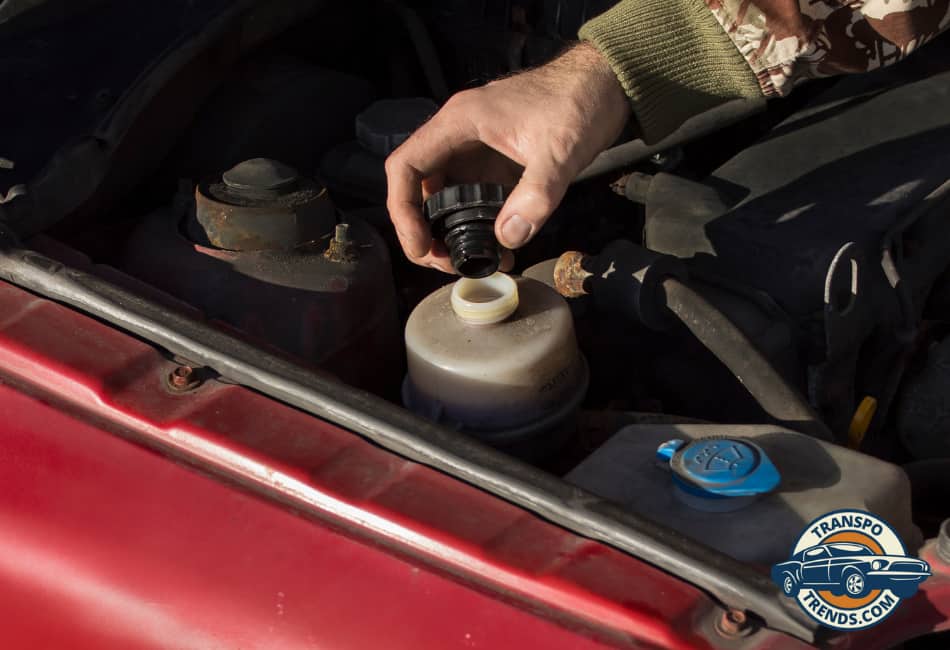Power steering fluid plays a pivotal role in the smooth and efficient operation of your vehicle. This critical component makes steering your car a breeze, turning what could be a tiresome task into a convenient and effortless endeavor.
However, like all mechanical systems, power steering is prone to wear and tear over time, with the degradation of power steering fluid being a common issue.
In this blog post, we will answer the question of does power steering fluid go bad and then delve into the causes behind power steering fluid degradation and provide practical tips on how to prevent it.
So, does power steering fluid go bad? In short, yes. The properties that make power steering fluid an effective lubricant also means it can degrade over time, resulting in a range of issues such as leaks and undesired noises from the power steering system.
Why Does Power Steering Fluid Go Bad?
1. Contamination and Debris
The power steering system, by virtue of its design and operation, is susceptible to the accumulation of dirt and debris. As the vehicle navigates various terrains, tiny particles can enter the system, contaminating the fluid.
This contamination hampers the fluid’s performance and can lead to difficulty in steering. Over time, such debris can cause significant damage to the power steering pump and other components.
2. Heat and Oxidation
The power steering system generates heat due to its continual operation. This heat leads to oxidation of the power steering fluid, a process that changes its chemical composition.
The oxidized fluid can form sludge, reducing its effectiveness as a lubricant and potentially causing system blockages.
3. Moisture Absorption
Over time, the power steering system can inadvertently allow moisture intrusion. Moisture can be highly corrosive, causing deterioration of metal components and diluting the fluid’s quality. This corrosion can lead to leaks, reducing system efficiency and driving safety.
4. Aging Additives
Power steering fluid includes several additives designed to enhance its performance. However, these additives can degrade over time, affecting the fluid’s viscosity, lubrication properties, and overall performance. Aging additives can lead to increased friction and heat, accelerating wear and tear on the system.
5. Rubber Component Interaction
Power steering systems contain several rubber components, such as seals and hoses, which interact with the fluid.
Over time, the fluid can cause these rubber components to deteriorate, leading to leaks or system failure. It is essential to monitor these components regularly to ensure the longevity of the system.
6. Mileage and Time
The degradation of power steering fluid is influenced by both vehicle mileage and time. Regular intervals of fluid change, as recommended by car manufacturers, are critical in maintaining optimal system performance. Neglecting these intervals can lead to severe damage and costly repairs.
7. Improper Fluid Mixing
Using the incorrect or incompatible power steering fluid can lead to serious system problems. Every vehicle requires a specific type of fluid for smooth operation.
Mixing incompatible fluids can cause reactions resulting in sludge formation or reduced lubrication, potentially damaging the power steering system.
Always refer to the vehicle manufacturer’s recommendations when selecting power steering fluid.
How Do You Know If Your Power Steering Fluid Is Bad?
Detecting issues with your power steering fluid in a timely manner is crucial for the longevity of your vehicle’s steering system. Here are some signs indicating that your power steering fluid may be deteriorating:
- Unusual Noises While Turning The Steering Wheel
One of the first signs that your power steering fluid is going bad is the presence of unusual noises when you turn the steering wheel.
These noises can range from creaking to squealing or whining. This is often due to the fluid becoming too thin to lubricate the system properly, causing parts to rub against each other and generate noise.
- Difficulty In Steering
When the power steering fluid starts to degrade, you may experience increased difficulty in steering, requiring more effort than usual.
This stiffness in steering is often associated with a lack of lubrication in the steering system, as a result of aging or contaminated fluid.
- Changes In The Color Or Consistency Of The Fluid
Observing the color and consistency of your power steering fluid can also provide insights into its condition.
Fresh fluid is often clear or pinkish in color, while bad fluid may turn dark brown or black due to contaminants. The fluid may also become thicker, resembling engine oil, indicating potential issues.
- Burning Smell Due To Overheated Fluid
If your power steering fluid overheats, it can produce a burning smell. Overheated fluid is often a sign of degradation, as the fluid’s temperature regulation properties diminish over time and with constant exposure to heat, potentially causing damage to the system.
- Fluid Leaks Around The Power Steering Components
Finally, if you notice fluid leaks around power steering components, this could indicate that the fluid has caused rubber components to deteriorate over time, consequently creating leaks. Regularly inspect for leaks to avoid more serious issues down the line.
Does Power Steering Fluid Go Bad Once Opened?
One may wonder if power steering fluid goes bad once opened. The answer is yes, depending on the conditions it’s exposed to.
Opening a container of power steering fluid exposes it to air and moisture, two elements that can accelerate the degradation of the fluid.
Air exposure can introduce contaminants into the fluid, while moisture can cause the fluid to break down more rapidly.
These factors combined can compromise the fluid’s lubricating properties, rendering it less effective in its role within the power steering system.
Proper storage of opened power steering fluid containers is crucial to maintaining the fluid’s effectiveness.
It is advisable to securely seal the container after each use to reduce the exposure to air and moisture.
Store the container in a cool and dry place, away from sources of direct sunlight or extreme temperatures.
Lastly, it is recommended to use opened power steering fluid within a reasonable timeframe. This ensures that the fluid maintains its optimal properties, thereby guaranteeing the smooth operation of your vehicle’s power steering system.
Regularly inspecting the fluid’s color and consistency will help you determine whether it’s still in good condition or needs replacing. If in doubt, consult with a certified automotive professional for advice.
Does Power Steering Fluid Go Bad in the Bottle?
It’s common to question the shelf life of unopened power steering fluid. Generally, if stored correctly, it tends to maintain its properties for a lengthy period of time.
Unopened bottles of power steering fluid are typically less susceptible to degradation as they have not been exposed to air or moisture.
Therefore, when stored in a cool, dry place away from sunlight, their shelf life can be quite extensive.
This makes it convenient to buy and store power steering fluid in bulk, or to keep some handy for emergency situations.
However, while power steering fluid in an unopened bottle can remain viable for longer, it’s essential to check the manufacturing date on the container.
Fluids do not have an infinite shelf life, and the older the fluid, the higher the chance that it may have degraded over time.
Most manufacturers will provide expiration guidelines that should be adhered to for optimal performance.
It is always recommended to follow these guidelines as using expired or degraded fluid can lead to poor performance or potential damage to the power steering system.
In conclusion, power steering fluid does have a relatively long shelf life if stored appropriately.
Remember to check the manufacturing date and any expiration guidelines provided by the manufacturer to ensure that your vehicle’s power steering system continues to function smoothly.
Preventing Power Steering Fluid Degradation
Regular maintenance and checks of your vehicle’s power steering fluid are an essential part of preventing power steering fluid degradation.
Adhering to the manufacturer’s maintenance schedule is highly recommended. Regular fluid checks aid in early detection of issues such as fluid degradation and leakage.
Catching these issues early can prevent more serious problems down the line, saving you time and money on costly repairs.
- Timely Fluid Replacement
Knowing when to change your power steering fluid is a great way to maintain the health of your vehicle’s power steering system.
Most manufacturers advise changing the power steering fluid every few years or after a certain number of miles, depending on which comes first.
Proactive replacement of the fluid helps keep the system functioning optimally, preventing wear and tear and ensuring your vehicle drives smoothly.
- Choosing the Right Fluid
Using the recommended power steering fluid for your vehicle is crucial. Not all power steering fluids are created equal, and using the wrong type can lead to poor system performance or even damaging your vehicle.
It’s always best to refer to your vehicle’s owner’s manual or consult a professional to identify the correct fluid type for your particular make and model.
- Professional Inspection
If you notice any issues with your vehicle’s steering, it’s always wise to consult with a professional.
Trained mechanics have the expertise to diagnose and resolve power steering problems accurately and efficiently.
They can identify issues that you may miss and provide the necessary solutions to ensure your vehicle’s power steering system performs at its best.
Conclusion
In summary, maintaining the health of your vehicle’s power steering fluid is crucial for optimal vehicle performance.
Regular maintenance checks, timely fluid replacement, and using the recommended fluid type are all essential steps in this process.
When in doubt, a professional inspection can provide the assurance your vehicle is in good hands. We hope this knowledge helps you maintain your vehicle better.
Don’t forget to share this information with other vehicle owners and always prioritize your power steering system’s maintenance.
FAQs
Q: How often should I change my power steering fluid?
A: The frequency of fluid replacements depends on your vehicle’s make and model. Generally, it is recommended to replace the fluid every 40,000-50,000 miles. However, you should always consult with a professional or refer to your vehicle’s owner’s manual for accurate guidance.
Q: Can I use any type of power steering fluid?
A: No. Different vehicles require different types of fluid and using the wrong kind may affect your vehicle’s performance or even damage it. Make sure to consult with a professional mechanic or refer to your vehicle’s owner’s manual for accurate information on what type of fluid is best for your vehicle.
Q: Are there any warning signs that I should watch out for?
A: Yes. You should look out for signs such as difficulty turning the steering wheel, unusually loud noises while driving, or fluid leakage from the power steering system. If you experience any of these symptoms, it’s best to have a professional mechanic inspect your vehicle and provide guidance on what type of repair or maintenance is needed.
Q: How long does it take for power steering wheel fluid to go bad?
A: Power steering fluid can last anywhere from one to five years, depending on the type of power steering system and the environment. To ensure your vehicle is in good condition, it’s important to check the fluid level periodically. If you find that it has gone bad, then it’s best to have a professional mechanic replace it with new fluid at the earliest opportunity.

